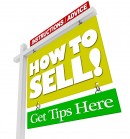When you have decided to sell your home, having a professional and experienced real estate agent will be crucial. From setting the right price to finalizing the deal, your agent should be your number one ally every step of the way. Finding an agent with significant experience that is able to be work on your behalf, be brutally honest, and market your property like it is the last home on the block will be essential in order to receive top dollar. For their service and attention you will pay though, according to industry norms the average sales commission is roughly 5%, which is why you need to get the most out of you agent. The following are a few tips that will help you select the most qualified and competent agent in your old neighborhood:
Pick from a Pool
Similar to when you are interviewing agents to assist you in buying a home, you should ask family and friends for references and conduct online searches through the National Association of Realtors and other real estate websites. Additionally, you should attempt to restrict your search to agents with the background and credentials that meet your needs. Agents that specialized in single-family homes, short sales, or condos typically advertise their expertise, this should be your areas of focus.
Review Their Marketing Plan
You will want your agent to provide maximum exposure for your home in the shortest period of time. In order to ensure that this occurs, you will want to review their marketing plan, which will give you an idea of how exactly they are planning on selling your home. Here are a few key items that you will want to see:
- A pre-listing home inspection to determine any possible concerns that you may encounter
- Staging support and expertise that will help you cast your home in the most positive light possible
- A single property website location
- An instant response phone number to provide a personal touch to each potential buyer’s phone call
- “Just listed” notices to the neighborhood with a focus on key target markets likely to buy
- A professional photographer to create pictures to attract buyers
- A floor-plan if one is not already available to complement the photos of your home
- “Take-away” fliers and comment cards for clients and agents alike to make sure your property stays on the top of their mind when they return from seeing your home
- Online advertising to help generate buyer leads
An open house schedule to promote your property to prospective buyers
- Distribution plan for “open house invitations” around the neighborhood and local retail stores
Verify Their Sales Track Record
Perhaps you have interviewed ten agents and now you are down to only two or three and you can’t decide between them. You should ask to see a track record of each agent’s sales, paying close attention to what the original asking price of each home was and then the final sales price. This should give you a good idea of their ability to price effectively and negotiate on behalf of their clients. Typically, the lowest-fee agent will have the greatest price reductions and longer time on the market for each of their homes. The spread between an agent who may charge 4.5% and 5.5% is 1%, so you should ask yourself if you come out ahead if your price ends up being reduced because you have selected a lower-fee agent. Typically, they will have a track record of not getting the asking price for you home because they did not have the ability to actively market and work on your behalf.
Understand Their Pricing Strategy
According to experts, the optimal time to receive the best offer is typically within 30 days of putting your home on the market, which is why pricing it correctly is so essential. If it is priced to low, yes, you will receive an offer immediately, but you will be leaving money on the table; and if you price it too high, then you will receive little interest. Typically, questionable agents will do one of two things, either they will purposely provide you with an overly optimistic pricing strategy in order to win your business or they will low ball your actual value in order to make a quick sale. The best way to hedge against this is to make sure that they provide a comparative market assessment (CMA) so you can see what similar homes are going for within your area. Additionally, you should ask them if they have any knowledge as to what type of trends are occurring within your neighborhood. For example, maybe the city just announced a new parks development a few blocks away from you home or there is going to be a new monorail station being built in the area, these are all key selling points that can add value to the price of your home beyond the CMA.
If you are still stuck, ask your pool of agents how much they believe that your house could be sold for given the current market. If two of them quote you a price around $400,000 and then one says $500,000, then you should question the third’s judgment. The higher bid is typically referred to as “buying a listing”, which is when an agent will come in with a higher bid just to get your business and disqualify the others.
Ask Questions
Remember, there are no stupid questions, so don’t hesitate to ask as many as you want until you feel comfortable with the agent that you are going to select. Within the “Buying-Selecting a Real Estate Agent” section, there are some additional questions that are still applicable to selling your home. Such as how many clients are you currently working with and what is the level of support and assistance that you receive from you brokerage? Feel free to ask away!







